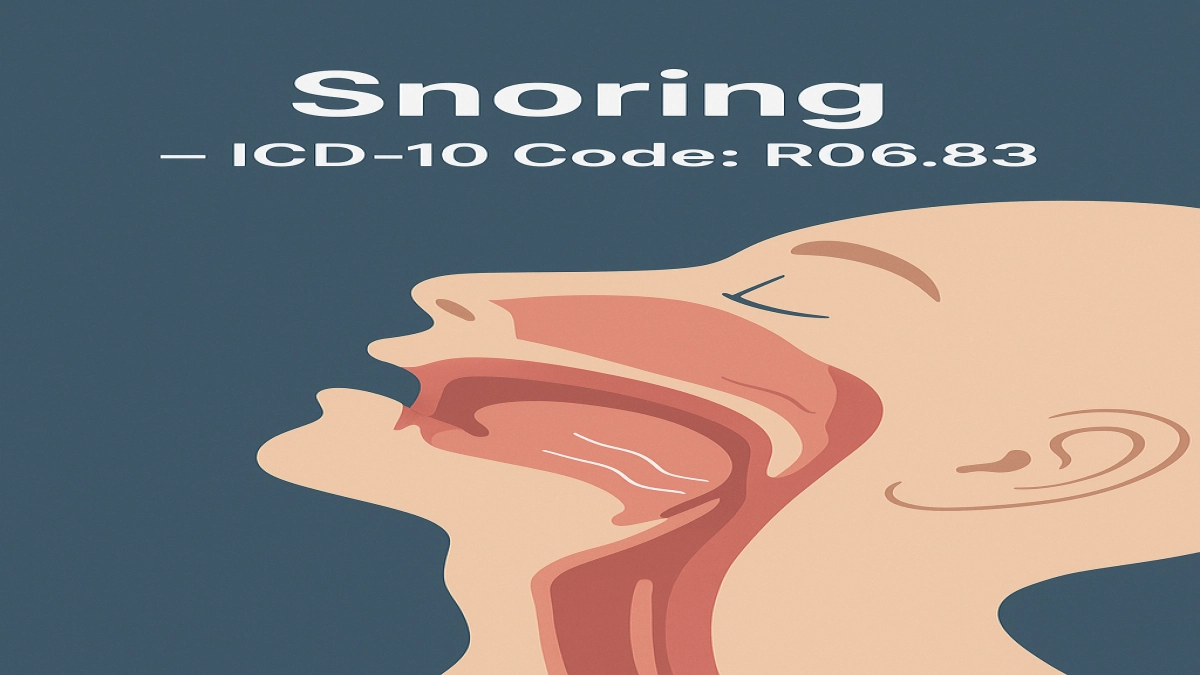Snoring is more than just a nighttime annoyance. For many, it is a sign of an underlying condition that may affect overall health. In medical records, proper coding of snoring is essential for diagnosis, treatment planning, and insurance claims. The ICD-10 system provides the specific code used by healthcare providers in the United States to classify snoring.
This article will explain the snoring ICD-10 code, when it is used, how it connects to related sleep conditions, and what treatment options are available under American medical guidelines.
What Is the ICD-10 Code for Snoring?
The official ICD-10-CM code for snoring is R06.83.
- Code: R06.83
- Category: Symptoms and signs involving the circulatory and respiratory systems
- Billable/Specific Code: Yes – it can be used for insurance reimbursement and clinical documentation.
This code is applied when snoring is documented as a primary symptom. If a sleep disorder such as obstructive sleep apnea (OSA) is diagnosed, providers may use additional or different ICD-10 codes to reflect that condition.
Why Snoring Needs Proper ICD-10 Coding
Accurate ICD-10 coding serves several purposes:
- Insurance Claims: Ensures proper billing and reimbursement.
- Medical Records: Provides a clear record of patient history.
- Treatment Tracking: Helps providers monitor whether snoring improves with treatment.
- Research Data: Supports medical studies on the prevalence of sleep disorders.
Common Causes of Snoring
Snoring happens when airflow is partially blocked during sleep, leading to vibrations in the throat tissues. Some common causes include:
- Relaxed muscles in the throat and tongue
- Being overweight or obese
- Nasal congestion or chronic allergies
- Anatomical issues such as enlarged tonsils or deviated septum
- Alcohol or sedative use before bedtime
Snoring and Related ICD-10 Codes
Snoring is often linked to other sleep and breathing disorders. Physicians may document these conditions with additional ICD-10 codes:
- G47.33 – Obstructive sleep apnea (OSA), adult
- G47.30 – Sleep apnea, unspecified
- R06.81 – Apnea, not elsewhere classified
- R06.89 – Other specified abnormalities of breathing
When coding, providers follow the American ICD-10-CM guidelines to select the most specific code supported by documentation.
Evaluation and Diagnosis in the U.S.
In the United States, snoring that affects sleep quality or is linked to other symptoms is often evaluated through:
- Sleep study (Polysomnography): Measures breathing, oxygen levels, and sleep cycles.
- ENT evaluation: Checks nasal passages, throat, and airway structure.
- Lifestyle review: Identifies contributing factors such as alcohol use or weight.
Treatment Options for Snoring
Treatment depends on the underlying cause. According to U.S. sleep medicine guidelines, options include:
- Lifestyle changes: Weight loss, avoiding alcohol before bedtime, changing sleep position.
- Nasal treatments: Allergy medications, nasal dilators, or surgery for structural issues.
- Oral appliances: Devices fitted by dentists to keep the airway open.
- CPAP therapy: If linked to obstructive sleep apnea, continuous positive airway pressure may be prescribed.
- Surgery: In severe cases, procedures like uvulopalatopharyngoplasty (UPPP) or Inspire therapy may be considered.
When to See a Doctor
Occasional mild snoring is common, but medical evaluation is recommended if snoring is:
- Loud and persistent
- Associated with daytime sleepiness
- Linked with choking or gasping at night
- Affecting a partner’s sleep
- Combined with high blood pressure or other health risks
These may indicate obstructive sleep apnea, which requires more specific ICD-10 coding and treatment.
Key Takeaways
- The ICD-10 code for snoring is R06.83.
- Proper coding helps with insurance billing, medical history, and treatment tracking.
- Snoring can be a symptom of serious sleep disorders such as OSA (G47.33).
- Lifestyle changes, medical devices, and CPAP therapy are among the treatment options.
- Patients should seek medical advice if snoring is persistent, disruptive, or linked with other health concerns.

